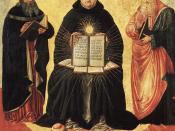PART I: Questions addressed to Lonergan
1. Father Lonergan, you name your philosophy "Critical Realism."
a) What is Critical Realism?
Critical Realism is the philosophical position that states that the real is that which is known by the 3-fold process of attentive experience, intelligent inquiry, and responsible judgment. Reality is that which is known by totality of correct judgment.
b) Thomas Aquinas is a Realist philosopher. Can you name one way that you see Critical Realism related to Thomistic Realism? Or is it totally different?
Thomistic Realism is the philosophical position that states whatever exists can be known, or in other words, "Being is intelligible." Thomistic Realism also says the object known corresponds to the thing (object) existing in the world, and the proper object of the human intellect is the nature of the material thing. However, the essence of the object can only be grasped in the mind through the Thomistic cognitional process that relates to the 3-fold process employed in critical realism.
The three steps that provide the framework to Critical Realism are attentive experience, intelligent inquiry and reasonable judgment. These three steps are analogous to the sense experience, abstraction, and judgment that St. Thomas describes in his process of cognition. In other words, Critical Realism and Thomistic Realism correspond with one another very closely and are very complementary with one another. In addition, both of these giants of philosophy (Lonergan and Thomas) admit that we must first experience the data through our senses before we can truly know the object. In the two compatible steps of Thomas' abstraction and Lonergan's understanding, we must come to know the nature of the material thing by asking questions and ignoring particulars. Finally, we may make a judgment as to whether or not our "bright idea is a...


